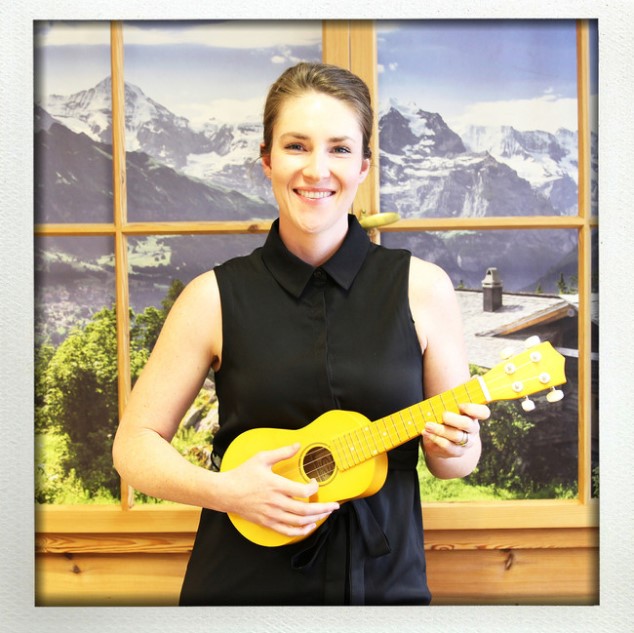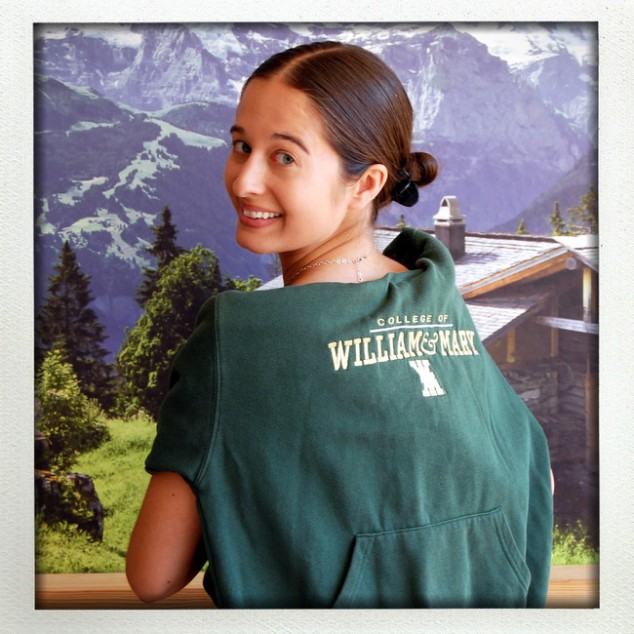In the series “Off Duty”, various members of the InterNations team share their personal stories about a global lifestyle and the international experience.
For this blog post, we’ve interviewed Lenore and Paula, two expats working in our Content & Communications Department. They are both from the United States, both are married to a German husband, and both have decided to raise their children bilingually.

To kick off this interview, just tell us a bit about your children.
Lenore: I have a son, his name is Peter, and he’s now about two years and eight months.
Paula: My son Julian is two-and-a-half years old, and Rosie — my second kid — is almost three months. She obviously isn’t talking yet, unlike her big brother.
But Julian is already learning to speak both German and English?
Paula: Yes, he has been saying words for around a year, and I think raising him bilingually works out really well. My husband speaks only German with him, while I speak only English. The only exception is when I’m in public and need to talk to people in German, like his daycare teachers, but he doesn’t really seem to notice yet that I can switch languages, too.
If Julian wants something and is in the same room as us two, he usually repeats the word in both languages until he gets whatever he wants: for example, he’ll say “apple” to me and Apfel to his Papa (daddy). He’s clearly figured out which language to use with whom.
We’re also following some very useful advice from a book I read on this topic: If bilingual children learn a new word, they will most likely know it in only one language. So, if Julian talks to me and uses a German word because he doesn’t know the English translation, I’ll repeat it in German first and add the English word right away. That’s supposed to be the best way to reinforce: “Hey, it’s not wrong what you’re saying, but here’s another word for this.” The kids won’t be discouraged and come to understand that both words mean the same.

What about you, Lenore? How has it been working out so far?
Lenore: We’re also practicing the “one person — one language” method. My husband speaks only German with our son, while Peter gets his English from me. Well, me and Netflix. Sometimes, I’m actually surprised at how much English he speaks as his daycare is all in German. He usually says a word in either language, though there are some he definitely uses both for.
I’m also trying to stick to the method Paula describes. If my kid has learned a new word in German or simply says something in the “wrong” language, like Hund, I’ll just go, “Yes, that’s right! That’s a dog!” instead of correcting him. Sometimes, Peter has quite a strong reaction, though. He once tried to correct his dad on his pronunciation of Bus (vs. the English “bus”), and they had a bit of a back and forth, which was pretty funny to observe!
What are your children’s general language skills like by now?
Paula: We are getting to full sentences, simple constructions with two or three words. Julian’s a little behind other kids the same age when it comes to language development, especially girls. Girls often seem to develop faster, and it’s also normal for bi- and multilingual children to take more time. They have to figure out how two or more languages work and process at least twice the information, so we’re not worried about him being a bit slower.
Lenore: Yes, some of the kids who are the same age as Peter are much further along in their language development, particularly girls, including the bilingual ones. They may even have a concept of “English” and “German” as abstract terms and can distinguish clearly between the two languages, but I’m not sure Peter grasps this quite yet. Maybe he has some idea, but he hasn’t vocalized it, as in, “This is German, and that’s English!”
His language skills have really taken off this year, though. In Germany, you have a series of mandatory doctor’s appointments with your kids, one shortly before or around the time they turn two. You fill out a form, sharing information on how much they’re speaking and other milestones. We had this exam last September, and Peter was saying hardly anything in either language at that point. The doctor even had us come back a couple of months later to see if everything was okay.
But now Peter’s also up to very short sentences, which is relatively new for him. I can tell his language development has really been picking up: I’m still updating a spreadsheet to keep track of every new word, and I’ve fallen way behind.

What was Peter’s first word then?
Lenore: This is a good question… I’m not 100% sure if it was his very first word, but “car” — or Auto — was among the first he knew in both English and German. Auto was my husband’s first word as well, so perhaps it runs in the family.
Did you have any personal experience with bilingualism before you had children?
Lenore: I used to live in Munich for three years as a child, from when I was four to age seven. This is the perfect time for picking up another language — and so I did: Apparently, I learned to speak German like a second native language. My dad was already fluent, but my mom was studying it, trying to learn der, die, das, and all those things, while I didn’t even have to think about it. I’m pretty jealous of my younger self!
After we returned to the USA, my dad tried to keep up speaking German with me, but six years was just too long to do this without any additional motivation. I had to start afresh in my eighth-grade German class. By then, I was very motivated to learn it again, so my experience did help me in that respect.
My classmates would complain I had an unfair advantage, but I’d really forgotten most of my German. And I had never studied it formally, either, so I also had to learn all those grammar rules. However, I did find the pronunciation surprisingly easy: I wasn’t perfect or anything, but maybe something had stayed with me from learning German at such a young age, while it would have been much more difficult for an adult.
I continued taking German classes all the way through middle school and high school, as well as in college. I knew I wanted to spend a year abroad in Germany, ideally in Munich. Moving back here was a great opportunity to practice my conversational skills and to gain more confidence in expressing myself in another language. And of course, that’s also how I met my husband.
Paula: I didn’t grow up bilingually, but my husband did. He spent all eighteen years of his childhood in Rome, where his father worked for an international organization. He went to an Italian kindergarten and then attended the Deutsche Schule Rom. It follows a German curriculum, but up to 80% of the students were Italian. So, in the schoolyard and on the street, he’d speak Italian with his friends.
My husband has even picked up the Roman dialect, which always confuses the people we meet during our annual summer vacation in Italy. Shopkeepers and so on will stare at him since my husband looks very stereotypically German, but apparently he sounds like a proper local!
My own experience of adjusting to a bilingual life has been rather slow. I’d formally studied two other foreign languages before — Spanish and French — but I find German much more difficult. My husband and I continue to communicate mostly in English, though we’ve tried to switch to more German at home multiple times. And of course, due to my job at InterNations, I also speak English at work, which is both a huge benefit and a major disadvantage. It’s a lot of time out of my day when I could be improving my German instead!
But I’m conversational in German, and I can talk about my everyday life. Having two kids in Germany has been a big learning curve, as you need to speak to a lot of people, such as doctors and nurses, midwives and daycare staff. You just have to do it, period. Living in Upper Bavaria, south of Munich, hasn’t necessarily made it easier: I’ve often had to deal with the local dialect and will just be like, “Um, excuse me?”
I’m finally going to take a German course this autumn to get even better. It’s nice to have a protective English-language bubble, but it also means you aren’t really integrating, I think. I’ll be staying here for the long term, and I’d really like to show some good faith, so to speak, and make a commitment.
Fortunately, German will just come naturally to my kids, and so will English. Both my husband and I see the benefits of multilingualism. When they start foreign languages in school, we’d rather push them to learn something other than English. We hope we can get them to pick up a third language as they’ll be automatically fluent in two anyway. Maybe Spanish — I used to take Spanish classes, and my husband speaks quite a bit of Spanish at work — but we’ll see.

Are you planning to send your children to an international school when they are older?
Lenore: No, not really. As I’ve already mentioned, Peter’s daycare is all in German, so it’s probably good he’s getting to hear and speak a lot of English in the afternoon and on the weekend. At this point, we aren’t planning on sending him to a bilingual kindergarten or an international school.
It might be different if I was the only person that could speak the second language with him and he’d get all his exposure just from me. But English is prevalent in lots of places, and we have plenty of English-speaking friends. In the future, we might look into something like a fun summer camp for English-speaking children to fill the long vacation in August. But who knows what’s going to happen in a few years?
Paula: Julian doesn’t attend a bilingual daycare center, either, and I don’t think I even want to send him to an international school. He’ll be international no matter what because we — his parents — are an international couple, and I’d like him to get the full German experience instead.
Some day, we might also move to the US for a few years. Then, he could get as much American input as possible, and at some point, he’ll probably choose a culture because it’s hard to live both equally. I’d like to give my children the purest experience of both, Germany and the US, and let them figure out which one they prefer when they are old enough.
Living in Germany, how do you make sure they get enough input in English?
Paula: I guess about 60-70% of Julian’s language exposure is in German, with the rest being English from me or whichever TV shows he watches. We also have regular video chats with my parents in the US, and that’s a funny topic: My mom has always been interested in other languages and cultures, and when I dated and married a German guy, she’d pick up a little German here and there. Now that I’ve had kids in Germany, she wanted to learn German in order to speak it with her grandchildren. I actually had to talk her out of it!
Their exposure to their grandparents’ language and culture is very important, and I had to explain to my mom that I want her to be as American as possible. They need to see it’s not just mommy speaking English, or the TV, but that there’s a larger English-speaking environment out there. I need my family’s reinforcement to teach Julian and Rosie, even if my mom was a little disappointed.
But having said this, we do watch a bit of English-language TV together. Right now, Julian is obsessed with a show called Spirit Riding Free, which is all about the adventures of a girl and her mustang in a US frontier town. He’s kind of crazy about it: whenever he shouts, “Horsie, horsie!”, it means he wants to watch an episode. And like any other kid in the world, he loves Peppa Pig. These are his two favorites — one American, one British, which I guess is fine.
Lenore: I also try to expose Peter to more English via reading to him or watching videos together. I know he has picked up new words from his favorite shows, which makes me feel a lot better about all the screen time.
He likes Peppa Pig, too, but he loves Paw Patrol, an animated series about a crew of search and rescue dogs, and Dora the Explorer. It’s a US show that also features a little bit of Spanish, which could be potentially confusing, but I rather like it: It’s a very interactive program, where they ask the kids questions and try to get them involved in what’s happening on the screen. Just this morning, I heard him yell ¡Abre!, the Spanish word for “Open!”, at the TV because he wanted to help Dora, which I found really cute.
I read to him a lot in English, too. He especially loves Curious George, a series of popular picture books about a little chimp and his adventures in a big city. They are lovely and funny, but right now, it’s the same one over and over and over again. It’s normal for kids, especially toddlers, to enjoy repetition and familiarity: Peter can always tell me what’s going to happen next in his favorite book. For parents, however, Curious George Goes to the Chocolate Factory isn’t quite as exciting the 100th time!

Is there anything you are potentially worried about?
Paula: What can happen when bilingual kids are older — like, six, seven, or eight — is that they realize one parent is speaking the non-dominant language. Then they may start finding this language and even the parent wrong or weird or “not cool” or whatever you’d like to call it. They might disregard both the parent and the language altogether, which can be a tough obstacle to overcome. I’m kind of curious to see if or when this is going to happen with my children, but at least I’ll be prepared for this eventuality.
Lenore: I used to babysit for a bilingual family here in Munich, and the son did go through a phase when he refused to speak English with me or his mother. He was just about to start school, all his best friends spoke German, and he suddenly felt uncomfortable with something that set him apart. This is a good experience to have now I’m a mom myself: If something similar happens with my son, I know not to take it personally. It usually is just that: a phase. I simply continued talking in English to the boy I was babysitting, which he understood perfectly. At some point, we were back to English — things will be just fine.
Photo credit: Pexels / iStockphoto / InterNations
To protect the children’s privacy, no actual family pictures are used in this post.
I attended a language acquisition course during my studies which covered the way children learn different languages and what happens when they are exposed to multiple languages at a time. It was really helpful, now that my husband and I are planning to raise our daughter with three languages, Polish being the main one spoken at home. My husband was raised here so he will be additionally responsible for German, although we know the child will pick it up anyway. I’ll speak to her in English as well but the main focus will be definitely on Polish.
You don’t have to live abroad or have a partner whose native language is different than yours to raise your child bilingually. Nowadays, more and more young mothers in Poland start speaking English to their children from the very beginning. It does affect the overall language learning process (children usually prefer using English to Polish since it’s much easier) but the long-term advantages are really worth it.
I’m quite impressed by your plan to raise a trilingual kid.
Fun fact: Polish is regularly among the languages that our respondents in the Expat Insider survey consider among the most difficult to learn. So, at least your child will have a much easier time by acquiring it as a native language rather than having to study it as an adult!